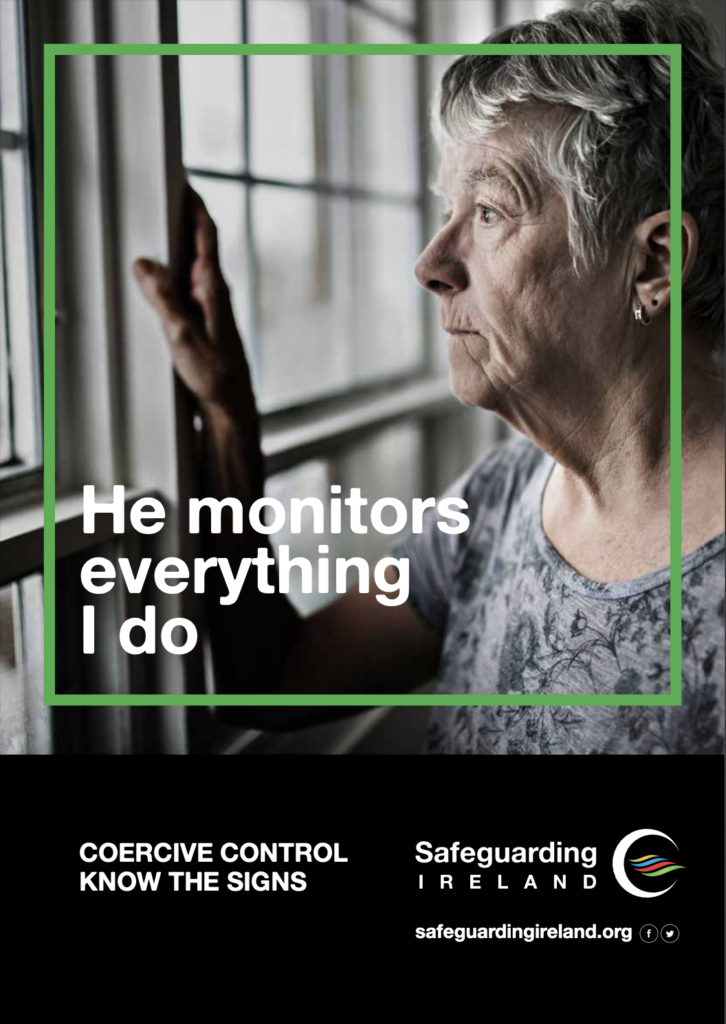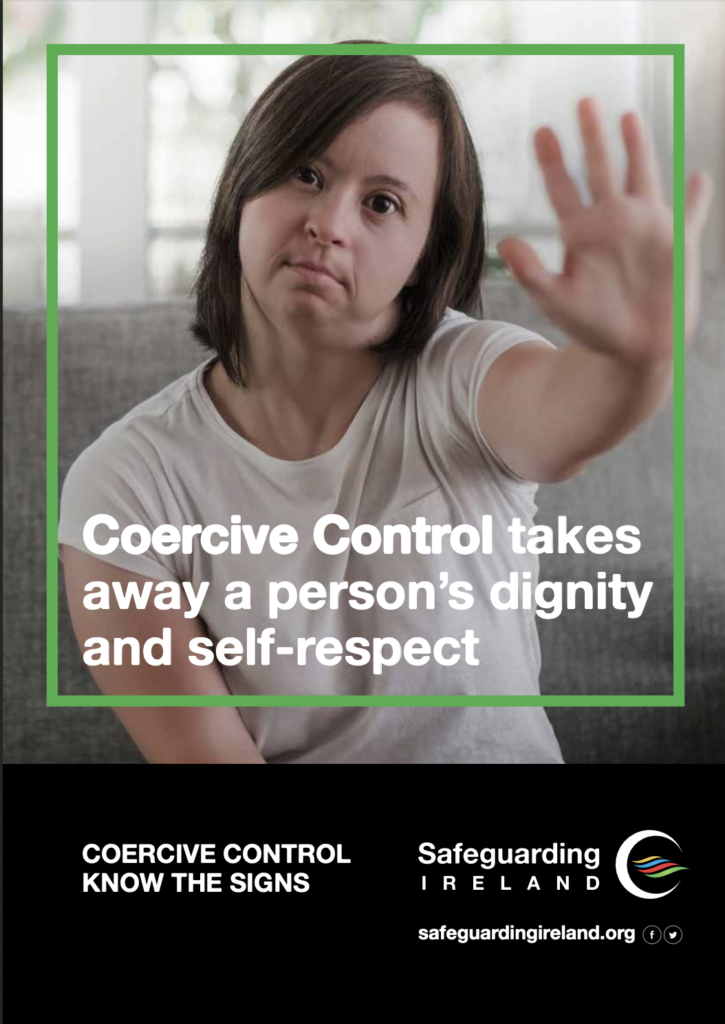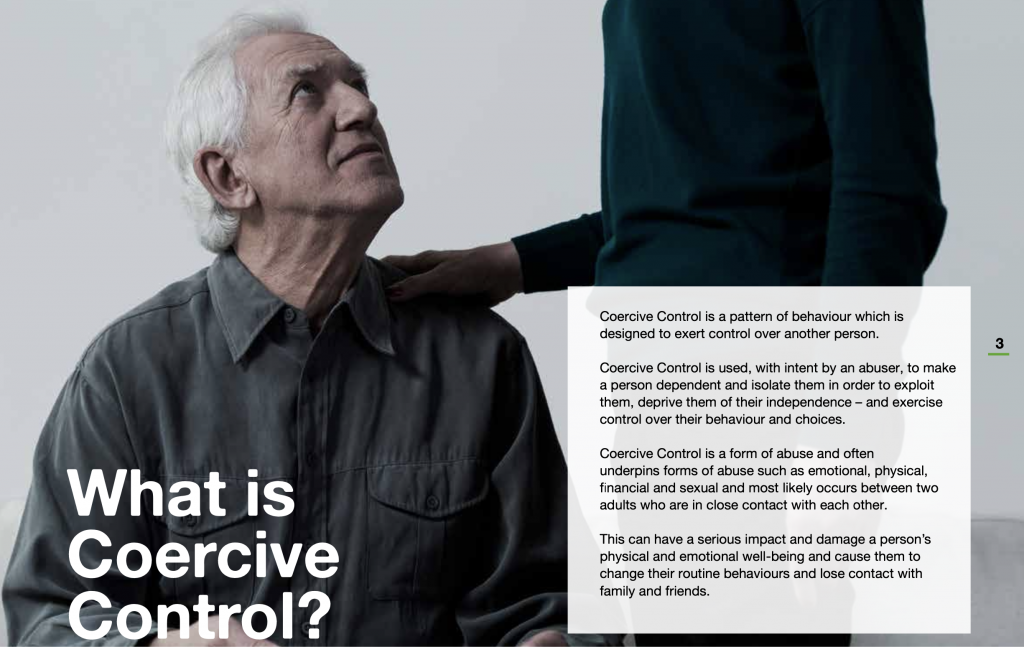Coercive Control – May 2021.
Safeguarding Ireland’s May Public Awareness campaign was on Coercive Control.
What is Coercive Control? How do we understand it better the need to work towards expanded laws to prevent it.

Information Leaflet
Radio Ad
Coervice Control


What is Coercive Control?
Coercive Control is a pattern of behaviour which is designed to exert control over another person.
Coercive Control is used, with intent by an abuser, to make a person dependent and isolate them in order to exploit them, deprive them of their independence – and exercise control over their behaviour and choices.
Coercive Control is a form of abuse and often underpins forms of abuse such as emotional, physical, financial and sexual and most likely occurs between two adults who are in close contact with each other.
This can have a serious impact and damage a person’s physical and emotional well-being and cause them to change their routine behaviours and lose contact with family and friends.
Difficult to detect
Coercive Control is subtle and difficult to detect from the outside looking into a relationship (where one person trusts or is dependent on another person), so too can it be hard to spot when in the relationship itself. The abuser may be careful to conceal it.
As behaviour worsens each incident of abuse becomes a new normal. Being under Coercive Control often reduces a person’s ability to think independently, or have time and space to seek support.
Signs of Coercive Control include:
- Detaining a person at home
- Restricting a person’s movements
- Constant monitoring of a person’s whereabouts
- Preventing contact with family or friends
- Excessive contact via the phone, email, or social media
- Keeping a person’s phone from them
- Controlling money or medical care
- Imposing and making decisions on someone’s behalf
- Ongoing undermining of a person’s independence
- In serious cases, assault and violence.
Low level of Public Awareness of Coercive Control
In research commissioned by Safeguarding Ireland, a low level of public awareness of Coercive Control was found:
- 40% said they didn’t understand Coercive Control
– 25% said they were not familiar with Coercive Control
– 15% said they had heard the term but did not understand it - Just over a quarter (28%) said that they understood it.
When then provided with an explanation of Coercive Control:
- 30% said they had witnessed this happening to someone they knew
- 13% said they had experienced it themselves.
Coercive Control is more common than we think
Safeguarding Ireland believes Coercive Control to be more common than we think.
We are all at risk of Coercive Control at times in our lives, particularly at difficult times. Those who can be most at risk are vulnerable people living with a long term mental, intellectual or physical disability, or frail older people.
Domestic abuse within an intimate couple has increased during COVID-19 and often includes Coercive Control with other types of abuse such as emotional, physical, financial or sexual.
Greater awareness needed
Greater awareness is needed among the general public, professionals and those who may be vulnerable to identify and report Coercive Control, or any type of abuse.
Current laws only recognise Coercive Control as an identifiable crime in the setting of an intimate couple relationship.
However, Coercive Control can occur in any close contact adult relationship and Safeguarding Ireland believes that laws should be expanded to recognise it as a crime in any relationship or setting where it occurs.
Report Coercive Control
If you suspect that you are experiencing Coercive Control, or witnessing this occurring to someone else – don’t hesitate to take action and report it.
If you or any person is in immediate danger contact An Garda Siochana at 999 / 112. If a person is being mistreated but there isn’t an immediate danger, please report it to your local Garda station, or contact the Garda confidential line at 1800 666 111. A directory of Garda stations is available at garda.ie.
For an ongoing safeguarding concern that support is needed with contact the HSE National Safeguarding Office at: Email: safeguarding.socialcare@hse.ie Tel: (061) 461 358. There are nine Safeguarding and Protection Teams covering all regions in the country.
There are also support and helpline services available for people who need to talk confidentially. Details are at:
- Men’s Aid: www.mensaid.ie
- Men’s Network: www.mensnetwork.ie
- Safe Ireland: www.safeireland.ie
- Women’s Aid: www.womensaid.ie



